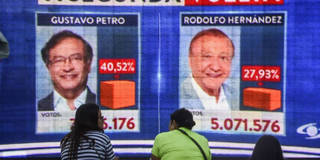
Colombia’s Battle of Populisms
Neither candidate in the presidential runoff in June wants to talk about hard choices. Everything will be fixed with a large dose of fiscal populism or, alternatively, by a successful businessman’s magic touch.

Neither candidate in the presidential runoff in June wants to talk about hard choices. Everything will be fixed with a large dose of fiscal populism or, alternatively, by a successful businessman’s magic touch.
BOGOTÁ – Colombians will have to wait a little longer to elect a new president. With none of the candidates receiving more than 50% of the vote in the first round, a runoff will be held on June 19 between two anti-system candidates, Gustavo Petro, who won 40.3% of the first-round vote, and Rodolfo Hernández, who won 28.2%. Federico Gutiérrez, supported by the right-wing parties that have governed Colombia during the last four years, who was expected to make it to the runoff, finished third with 23.9%. After conceding defeat, he endorsed Hernández.